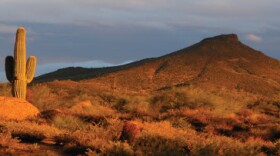Nine cases of coronavirus have now been confirmed in Arizona. In some of the state’s more rural counties the disease hasn’t yet appeared, but local health officials from preparing for an infection rate that could resemble an average flu season. KNAU’s Ryan Heinsius spoke with Coconino County epidemiologist Matthew Maurer about how COVID-19 is transmitted and how the public can reduce the risk of getting sick.
Matthew Maurer: The main way we’re seeing the spread of COVID-19 is through respiratory droplets. And it’s the direct contact with those respiratory droplets that’s the main risk factor.
Ryan Heinsius: How long can coronavirus live on inanimate objects like counters or door handles or even shirt sleeves if you sneeze or cough into them?
MM: That information is still under investigation as to how long it can survive on surfaces. The indirect contact with the respiratory fluids has seemed to be lower risk, but still there is that potential for transmission, so we’re still asking people to clean their surfaces, sanitize surfaces regularly, but as far as the information regarding just how long this COVID-19 can survive on surfaces, we’re not sure.
RH: Statewide health officials and national health officials are expecting considerably more cases of coronavirus. Do you, as an epidemiologist in Coconino County, anticipate that we’re going to see cases here?
MM: That’s the expectation. That’s what we’re hearing, like you said, from CDC and state health departments, and so here in Coconino County we are preparing, getting the community prepared, ourselves prepared for widespread transmission.
RH: Other countries, especially in Europe, Italy for instance, they’ve taken very extreme measures to prevent public gatherings and locking down millions of people. If the county does end up confirming a case here what steps might the county be taking?
MM: Our main goals are to identify cases and isolate those that are sick and then quarantine individuals that were potentially exposed and then, of course, protect our vulnerable populations. And so, as we start to see cases it’s going to really depend on the circumstances associated with the exposure and who’s exposed and that will dictate what level of intervention we will see.
RH: At this point are there everyday activities you recommend the public to avoid, like going to gyms or restaurants or public activities? Are we there yet?
MM: So, here in Coconino County we are not there yet. Since the risk is still low and we’re not seeing community transmission of this illness, not seeing any cases, confirmed cases at this point, we’re not recommending that people start staying away from their normal routines. However, what we are asking is if you are sick, for those individuals that are experiencing any sickness, that they practice the social distancing and stay home. And then for our more vulnerable populations—those over 65 or those with any underlying health conditions—to really think about their routines as well and going into public spaces.
RH: Spring Break is coming up for a lot of people. Any recommendations for avoiding certain travel?
MM: Yeah so, that’s a really tough one. That’s a really good question. As far as Spring Break, really following the guidance that’s out there, the travel advisories that CDC has. Within the U.S. we have some areas that have little clusters going on. We’re not seeing widespread transmission but there are some increased illness in certain areas, and we’re really not telling people to avoid going to those areas at this point. As that changes we’re really just asking people to stay up to date and looking at the information to see where are the areas that are at higher risk for becoming infected with COVID-19 and really avoiding those areas.









